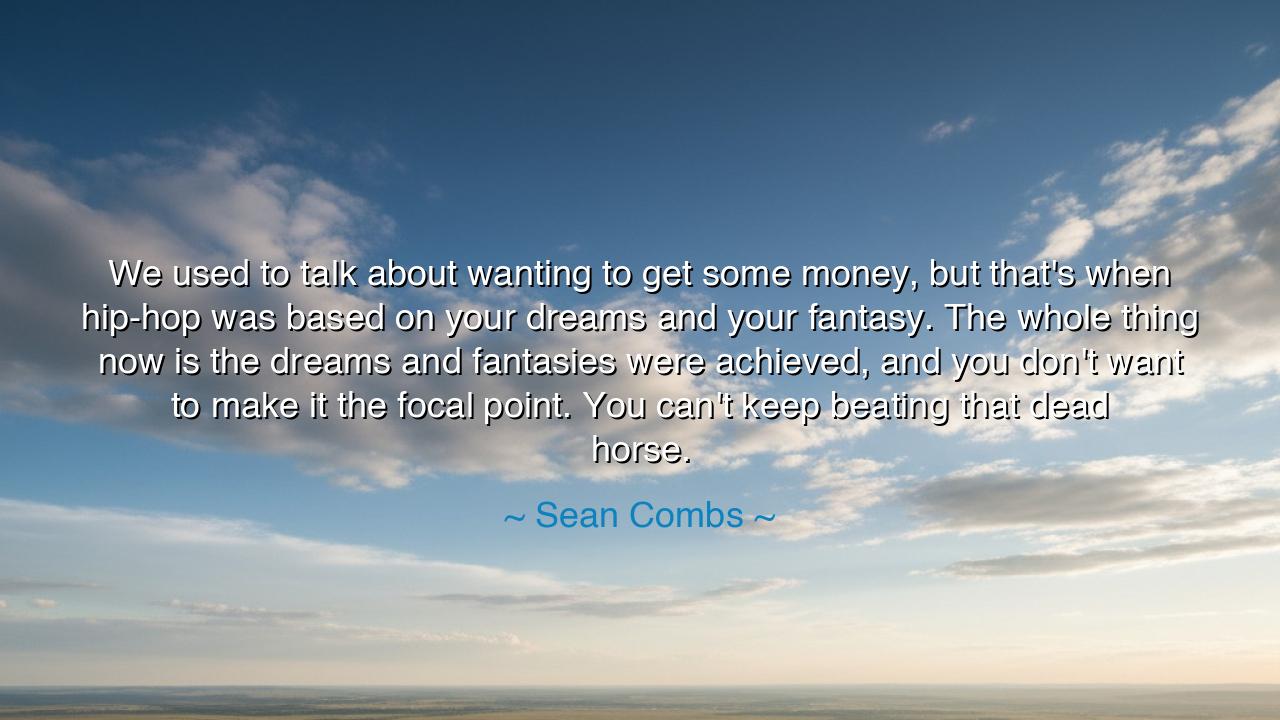
We used to talk about wanting to get some money, but that's when
We used to talk about wanting to get some money, but that's when hip-hop was based on your dreams and your fantasy. The whole thing now is the dreams and fantasies were achieved, and you don't want to make it the focal point. You can't keep beating that dead horse.






The words of Sean Combs, known to the world as a master of rhythm and ambition, speak with the weight of a prophet who has climbed the mountain of success and looked down upon the world below. “We used to talk about wanting to get some money, but that’s when hip-hop was based on your dreams and your fantasy... The whole thing now is the dreams and fantasies were achieved, and you don’t want to make it the focal point. You can’t keep beating that dead horse.” These are not the boasts of a conqueror, but the reflections of a sage who has learned that dreams fulfilled are not the end, but the beginning of wisdom.
In the early days of hip-hop, the streets were the forge of imagination. It was born in struggle, in the hunger of the spirit to rise above chains both visible and unseen. The dream was the kingdom of the poor man’s mind—where rhythm replaced riches, and words became gold. Young men and women, pressed by hardship, dreamed aloud through beats and rhymes of wealth, fame, and freedom. Their fantasy was not escapism, but a vision of transformation. They sang not of what they had, but of what they could become. And in this alchemy of art, they turned pain into purpose, dust into diamond, rhythm into revelation.
But as Combs reminds us, there comes a time when the fantasy becomes reality, and the very hunger that once gave birth to the movement fades into the comfort of success. When that day arrives, the artist—and indeed every human soul—faces a great trial. What does one do when the mountain has been climbed, the treasure found, the applause earned? If one continues to worship the same dream after it has been fulfilled, the dream becomes hollow, and the horse is beaten long after it has died. True creation, true growth, demands rebirth—new dreams, higher visions, deeper meanings.
So it was in the time of the ancient kings. Alexander of Macedon conquered the world before the age of thirty, yet when there were no more lands to take, he wept. His fantasy of conquest was fulfilled, and in that triumph, he discovered a loneliness deeper than defeat. His heart, once ablaze with destiny, was left with no new fire to kindle. The same lesson that befell Alexander confronts every creator, every dreamer, every soul that rises. To live only in the glory of what has already been achieved is to stagnate—to grow still while the world moves on.
Sean Combs, like the ancient masters of thought, speaks of the cycle of evolution—from desire to achievement, and from achievement to wisdom. Hip-hop, he says, can no longer live in the shadow of its first dream; it must now tell new stories, of legacy, of spirit, of community. In this truth lies a universal calling: that no art, no soul, no civilization can remain fixed in its first triumph. To keep life sacred, one must continue to grow, to question, to reach for something greater than material success.
Think of the poet Rumi, who once wrote that when the cup is full, it must be emptied again to be refilled with greater wine. So too must we pour out our old dreams once they are fulfilled, to make room for visions yet unseen. The artist who once dreamed of wealth must now dream of wisdom; the ruler who once sought victory must now seek virtue; the human being who once chased survival must now chase meaning. The focal point must shift from the outer world to the inner realm, from possession to creation, from ambition to illumination.
Therefore, dear seeker, take this as a sacred teaching: do not dwell forever in the victories of your past. Celebrate them, yes—but do not make them your home. Life is a river, not a monument. If you stop to build your palace too soon, the current will leave you behind. Let your achievements be the stepping stones to higher purpose. Dream anew when the old dream has been conquered; create again when the masterpiece is complete.
In the end, the message of Sean Combs echoes across ages: the purpose of dreaming is not to arrive, but to evolve. When wealth, fame, or success come, bow before them briefly, then rise and look beyond. For the soul that continues to seek, continues to learn, continues to dream anew—that is the soul that remains forever alive.






AAdministratorAdministrator
Welcome, honored guests. Please leave a comment, we will respond soon